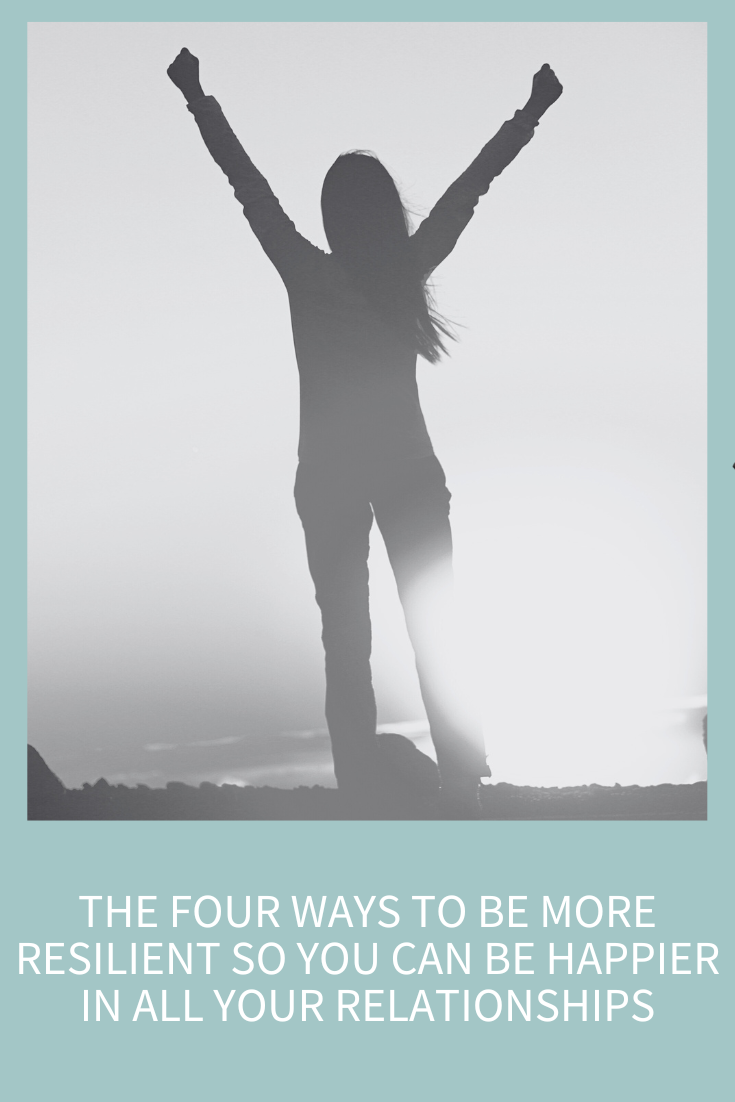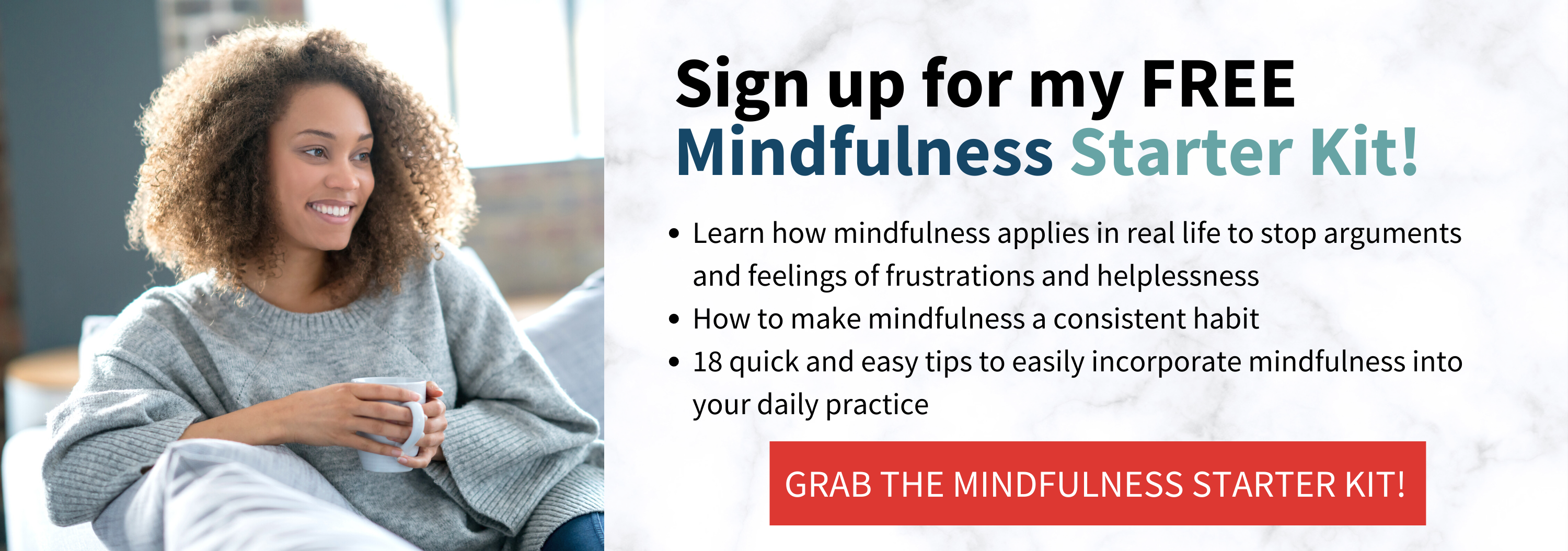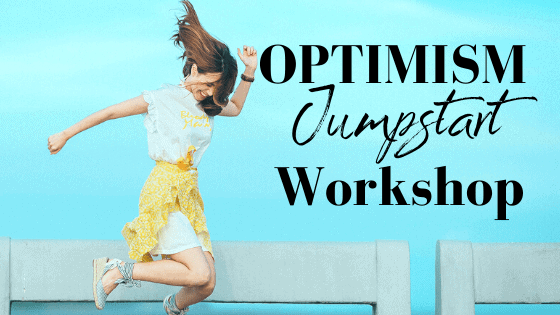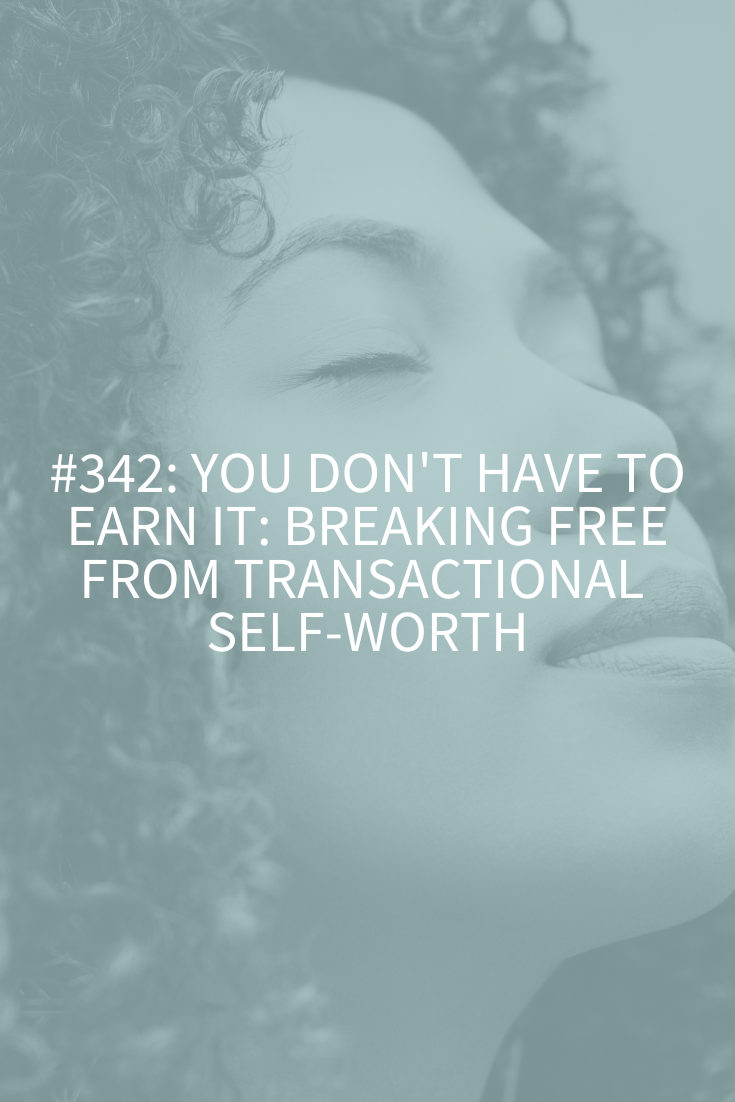
The research shows that resilient people do better in every area of life. They cope better with mental health issues like depression and anxiety, health crises, as well as money problems, and they do way better in all their relationships including romance, work and parenting. Today I’m teaching you the four ways to be more resilient so you can be happier in all your relationships.
12-minute read
Introduction
As I just said, resilient people really do better in every area of their lives. They cope better with money issues, health crises, fertility and child-rearing and mental health issues like PTSD, depression and anxiety.
There’s lots of research showing that, even after experiencing tragedies and hardships, resilient folks report:
- better relationships,
- more self-confidence and strength even when they’re feeling exposed and vulnerable,
- a more developed spirituality,
- an increased sense of self-worth,
- and an overall appreciation for life.
What is Resilience Exactly?
Resilience is a skill; you’re not born with it. Like any skill, it has some main components and, the more you practice and get good at those core components, the more resilient you’ll be. Psychologists define resilience as “the process of adapting well in the face of adversity, trauma, tragedy, threats or significant sources of stress — such as family and relationship problems, serious health problems, or workplace and financial stressors.”
To me, the real win with resilience isn’t just the ability to “bounce back” but the way you’ll grow and learn from the tough crap that happens in your life. Resilience helps you get through the next tough thing because you’ll learn to remember that you’ve gotten through a hard thing before, so you can do it again. Being resilient isn’t about ignoring the bad and just focusing on the good. It’s about leveraging your negative thoughts and feelings and creating positive adaptations to the negative stuff that will eventually happen.
It’s when your butt has gotten too big for your pants but, instead of getting depressed, you get fired up to start working out harder (because you know you can change it) or to start enjoying your juicy booty and happily go buy bigger pants.
It’s when you argue with your partner for the 100th time about their drinking but, instead of feeling hopeless that nothing will ever change, you get to therapy yourself and start going to Alanon.
It’s when your boss is an asshole (again) and, instead of entering a downward spiral of despair, you think about what you need to learn from this relationship and start working on your resume tonight!
As Mark Manson says (and this is my favorite quote of all time about resilience), “It’s turning lemons into a fucking pina colada.”
The Four Components of Resilience
There are four main components mentioned in the research that you can focus on to create more resilience in your life.
I. Connection:
The quality of your connection to others is one of the best predictors of resiliency in children and adults. Connecting to other people is like resiliency glue. The quickest and easiest way to connect with someone is to focus on bids. I’ve talked before in episode 195 about the importance of bids in all your relationships, but I’m going to do a quick recap now (I also have a whole chapter on bids in my Amazon #1 best-selling book, Be Happily Married Even if Your Partner Won’t Do a Thing).
Bids is a term coined by famed marriage researcher Dr. John Gottman. Bids are basically an effort to connect with someone. Gottman calls them the “fundamental unit of emotional communication.” Once you understand what bids are, you’ll realize that they’ve been happening all around you, but you haven’t understood their significance.
Here are quick examples of bids:
- Your kid yells, “Mommy look!”
- Your partner holds your hand.
- Your friend asks, “How did your conversation go with your boss?”
- Your coworker asks you to go for drinks after completing a big project.
- Your partner asks about planning a vacation.
- Your kid gets upset and throws something.
All of these asks or gestures, no matter how big or small, verbal or nonverbal, are attempts to connect with you. Your partner, kid or friend is asking for your attention. When your partner sighs aloud when looking at their emails, they’re looking for your interest or support, hoping to connect with you. When your mom comments that your dad is eating too much red meat, she’s looking for a connection about something that’s worrying her. When my Gary comments on a workout video he’s watching, he’s looking for me to show interest in this thing that interests him so he can feel closer to me.
Bottom line: No one is ever simply commenting on what they’re looking at or asking you a question; they’re looking to engage with you. And because people are doing the best they can with the tools they have (and often their tools suck), it’s not always clear that they’re looking to get closer. Many times these bids might seem like they’re trying to push you away – even criticizing you (or at least what you take as criticism) in an effort to connect. Complaining is an effort to connect. Nagging is an effort to connect. These are all bids in their way so it’s what you do with it that counts.
And you’re likely making bids yourself and you don’t even realize it! You send your mom an article to read, you send your best friend that funny YouTube video, you make a move to have sex or cuddle on the couch with your partner or you suggest to a coworker that they should try out that pottery class you just finished.
In Gottman’s research he talks about three things you can do when someone makes a bid: For example, let’s say you’re engrossed in something on your computer and your partner walks in the room and asks what you’d like to do for dinner.
Here’s how you could respond to the bid – you could:
- Turn towards the bid:
This would mean stopping what you’re doing and then giving your partner your full attention and having a back and forth about dinner ideas. Or you could tell your partner, “I definitely want to talk about dinner, give me five minutes to finish up and I’ll come find you.”
- Turn away from the bid:
You’d ignore your partner completely and don’t answer them. Or you don’t stop what you’re doing or look up and say, “Whatever you want is fine.” Another way to turn away from the bid is if you allow your attention to be easily diverted. If you’re in a conversation with your partner and then your kid walks in, and you allow the interruption or maybe you’re talking to your sister but then your phone dings and you look at the notification.
- Turn against the bid:
“Why are you always bugging me when I’m right in the middle of something?” or maybe you give a heavy sigh and eye roll and then say, “Whatever you want is fine with me.” It’s also turning against the bid if you interrupt or change the subject.
When you turn towards someone’s bid, you’re telling them you value them. One of the top complaints I hear in relationships is that someone doesn’t feel heard or seen. What they’re really saying is that they don’t feel connected. When you turn towards or lean into a bid, you’re connecting.
There are, of course, many other ways to connect. Think of volunteering, joining a running group or doing a Meet Up. For those of us in recovery, there are always 12-step meetings and other support groups depending on your particular struggle. Maybe it’s time to start a book club – anything that’ll bring you closer to those you care about. Or, you could go to your local temple, church or mosque and get connected!
II. Physical Wellbeing:
Feeling strong in your body and mind will absolutely help you feel more resilient. This doesn’t mean you need to be some CrossFit junkie who only eats bark. But it does mean that you need to take a minute and be respectful of your physical wellbeing.
Eating junk food constantly isn’t respectful. Being so out of shape that you make lots of noise when you get off the couch isn’t respectful. Ignoring your need for sleep is not respectful. Not taking breaks during the day and working nonstop is not respectful. Smoking nonstop is not respectful. Drinking too much booze is not respectful. Again, I’m not talking about needing to be on a strict diet and workout regime, although that’s fine if it works for you (and I’ll try not to hate you). I’m talking about being mindful and kind to your physical needs every day or as consistently as possible.
Next, you’ve got to get that mind in line. Calming your mind is key to finding the space to act and not react to situations, people and events in your life. There’s nothing better and quicker than focusing on mindfulness and making it a daily habit.
The other thing I do to keep my life feeling calm and to help me put things in perspective is to lighten the f up! Life does not need to be so heavy. I look for the joy and humor as often as possible. It’s so much easier to bounce back when there’s some lightness.
Humor always helps me keep things in perspective. It helps me feel differently in a given situation and be more resilient when the tough stuff comes up. Get out of that all or nothing thinking or thinking the world is out to get you in some way (please, the Universe is too busy to try to trip you when you’re walking to the kitchen).
Start your day on a positive note with this guided morning meditation.
III. Healthy Thinking:
Calming your mind, as we just discussed, is great, but what happens next? Getting calm doesn’t mean negative thoughts stop. In fact, sometimes when we’re quiet, those thoughts get the loudest. So, you’ve also got to work on changing your stinking thinking (as we say in the 12-steps). There’s one main tool I want to mention here because I spend a lot of time in a ton of other podcasts talking about how to be more in charge of your thinking, how to be more mindful, and how to stop negative thoughts. For now, I want to single out learning to be more optimistic.
During the course of his career studying resiliency, Dr. Dennis Charney, the dean of the Mount Sinai School of Medicine, examined a large group of Vietnam War veterans who were prisoners of war for anywhere from six to eight years. Although these men survived unspeakable torture and endured years in solitary confinement, Dr. Charney found that they were remarkably resilient. Unlike so many other veterans, they didn’t develop depression, anxiety or post-traumatic stress disorder after their release despite being under a level of extreme stress that most of us can’t even imagine!
What was their secret? Charney and his colleagues administered extensive interviews and tests and were ultimately able to identify ten characteristics that set them apart. The top qualities were optimism, altruism, having a sense of humor and having meaning in their lives. However, optimism, far and away, was the most important.
Having a positive outlook is the most important predictor of resilience.
When things happen to you, you have an internal dialogue and way of explaining these events to yourself. It’s what Martin Seligman of the University of Pennsylvania and the “father” of optimism research, labeled as Explanatory Styles.
For example, let’s say you’re brushing your teeth in the morning and toothpaste spills down your shirt. You might say to yourself, “I’m such a klutz! I’m always doing stuff like this! What’s wrong with me?!” or you might think, “Oops. Oh well, I guess I’ll change into my blue shirt. That looks better on me anyway!”
Both of these are ways of explaining to yourself what happened with the toothpaste but, as you can see, they’re very different explanations and will affect your self-concept differently.
Take the Free Learned Optimism Jumpstart Workshop
IV. Meaning:
Last but not least, if you want to be more resilient, you’ve got to find some meaning in your world. Obviously, helping others and volunteering is an easy way to get this job done. When I’m upset nothing helps me get my head out of my ass more than helping other people. Talk about a quick way to put things into perspective and stop taking myself and my life quite so seriously. There are always bigger fish to fry.
This does not mean that you don’t feel bummed, hurt, angry or upset. It means you don’t wallow in it. Feel all the feelz, and really go there, but then it’s time to reframe a bit. Finding meaning for what’s happening is an important way to bounce back from it.
The meaning might be something spiritual or religious for you. “It’s God’s will” or “Change is a constant in the Universe.” If saying these kinds of mantras to yourself helps put things into perspective, then keep doing that!
For others, these types of statements feel like bullshit platitudes. For you, I’d say to ask yourself, “What am I learning here?” I want you to assume this happened for a reason. It might not be a reason you like, but a reason, nonetheless. What can you take away from what happened? If you haven’t listened to my episode on Cognitive Reframing yet it’s absolutely time that you do. This will help you go deep on the how of changing your thinking and perspective.
Steve Jobs famously said, “You can’t connect the dots looking forward; you can only connect them looking backward. So you have to trust that the dots will somehow connect in your future. You have to trust in something — your gut, destiny, life, karma, whatever.”
Resilient people have confidence that they can get through the tough times or whatever conflict may arise, so they’re less stressed, and are able to be more vulnerable in relationships. This means they have more intimacy and emotional closeness with their friends, families and partners.
Research and Resources for The Four Ways to Be More Resilient So You Can Be Happier in All Your Relationships
Improve Your Relationships by Making and Answering Bids
Be Happily Married: Even if Your Partner Won’t Do a Thing by Dr. Abby Medcalf
Complaining Is As Bad For You As Bacon: And Just As Satisfying
How to Make Mindfulness a Habit
How 5 Minutes of Mindfulness a Day Can Make Your Relationship Great
How to Get of Negative Thinking
How to Stop Overthinking and Let Things Go that Bother You
Resilience: American Psychological Association Definition
5 Ways to Build Resilience and Conquer Adversity by Mark Manson
Resilience: The Science of Mastering Life’s Greatest Challenges by Steven Southwick and Dennis Charney
Smith, Emily Esfahani. “The Benefits of Optimism are Real.” The Atlantic, March 1, 2013
Steve Jobs to 2005 graduates: ‘Stay hungry, stay foolish,’ Stanford Report








